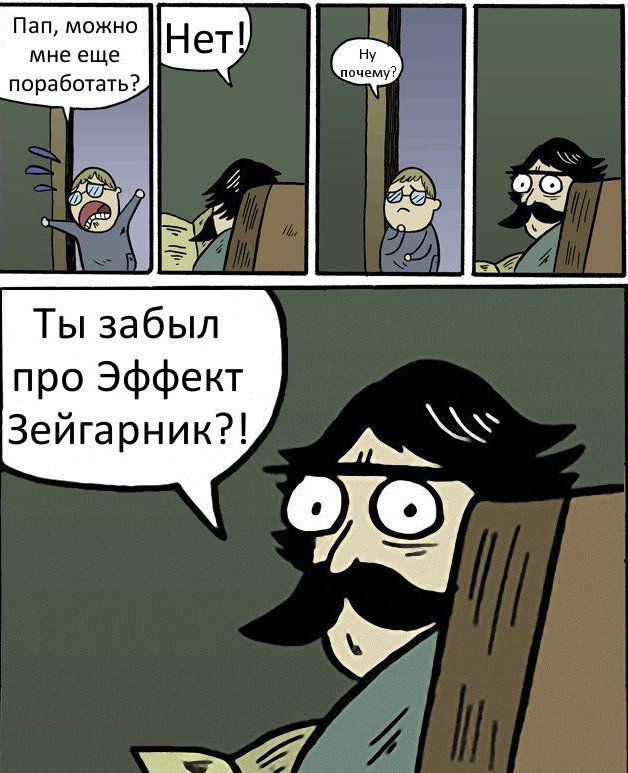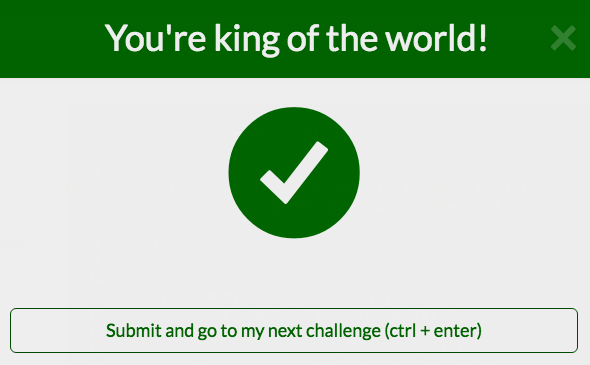Zeigarnik effect in practice
Zeigarnik effect can help improve your performance. First I will explain what the idea is, and then I will give practical advice on how to apply it in training.

Imagine it is now 9:00 pm. You are learning javascript. Sit at the table. Open your laptop and run the code editor. You are working, say, on a project from the freeCodeCamp resource - Wikipedia Viewer .
Work for a while, then get distracted, open a browser to read an article on the Mozilla Developer Network about sharing resources between different sources ( CORS ), because you want to deal with cross-domain Ajax requests.
')
Everything goes well. The longer you read an article on CORS, the better you understand it. It's getting late, it's time to round out.
What will you do next?
A) Leave the article unread to return to it the next morning?
Or
B) Will you bring the matter to a victorious end and finish reading?
The Zeigarnik effect recommends that you choose option A and not finish reading when a break is planned. Why?
Because according to the Zeigarnik effect, “ interrupted tasks are remembered better than completed ones”.
People are so set up that they feel the urge to complete the action, which is activated when a task is left unfulfilled. Recall how the mysteries in detective stories are gradually resolved, or about the feeling that you experience when you hang up the phone, without ending the argument with your loved one. This feeling of tension appears precisely because of the notorious burden of completing what has been begun, which effectively helps us remember unfinished tasks.
So, if you are an enterprising developer, you can easily apply this effect when you learn new tools or develop your skills. Because - with equal time spent on studying the material - the Zeigarnik effect can help you better and more effectively memorize development concepts.
But one idea how to use this phenomenon when learning to write code.
Professional life hacking: Leave a piece of code undone when “pret work” and return to it later.
Here you are working on one of the algorithms. You got the gist of the problem. Sketched some notes and pseudo-code on a piece of paper, made a high-class plan for how you would write this very algorithm.
Then you start translating your thoughts into code. Then more and more. The work is going well, and you begin to feel a surge of dopamine from the thought that the task will be completed soon and freeCodeCamp will give you a reward - a promotional message:

Now stop. Before you finish this task. Stop it. Make a conscious decision to stop the process. Get away from the computer and do something else.
“But I’m almost done!” You will say.
The idea is that when you interrupt yourself in the middle of a process, you not only memorize what you practice better, you also increase your motivation to continue working.
Traction to completion will be so strong that you will not be able to withstand a long separation from your computer. And when at last you return, you will definitely come off in full.
So, using the notorious Zeigarnik effect, you:
And with renewed energy. Double use.
Recently, I have been arresting Roald Dahl’s books and stories because he is an amazing author. And in one of his interviews, he described a strategy suggestive of the Zeigarnik effect:
You can listen to the full interview of Roald Dahl here.
Writing a novel and code is much closer than you think. Both are rich creative processes. If such stops during the successful process helped two legendary writers create works that the whole world admires, they can help you to improve your skills and create a useful product.
If you have any ideas how else you could use the Zeigarnik effect to improve your programming skills, we will be happy to see them in the comments. Thanks for attention!

What is the Zeigarnik effect?
Imagine it is now 9:00 pm. You are learning javascript. Sit at the table. Open your laptop and run the code editor. You are working, say, on a project from the freeCodeCamp resource - Wikipedia Viewer .
Work for a while, then get distracted, open a browser to read an article on the Mozilla Developer Network about sharing resources between different sources ( CORS ), because you want to deal with cross-domain Ajax requests.
')
Everything goes well. The longer you read an article on CORS, the better you understand it. It's getting late, it's time to round out.
What will you do next?
A) Leave the article unread to return to it the next morning?
Or
B) Will you bring the matter to a victorious end and finish reading?
The Zeigarnik effect recommends that you choose option A and not finish reading when a break is planned. Why?
Because according to the Zeigarnik effect, “ interrupted tasks are remembered better than completed ones”.
People are so set up that they feel the urge to complete the action, which is activated when a task is left unfulfilled. Recall how the mysteries in detective stories are gradually resolved, or about the feeling that you experience when you hang up the phone, without ending the argument with your loved one. This feeling of tension appears precisely because of the notorious burden of completing what has been begun, which effectively helps us remember unfinished tasks.
So, if you are an enterprising developer, you can easily apply this effect when you learn new tools or develop your skills. Because - with equal time spent on studying the material - the Zeigarnik effect can help you better and more effectively memorize development concepts.
But one idea how to use this phenomenon when learning to write code.
Professional life hacking: Leave a piece of code undone when “pret work” and return to it later.
Here you are working on one of the algorithms. You got the gist of the problem. Sketched some notes and pseudo-code on a piece of paper, made a high-class plan for how you would write this very algorithm.
Then you start translating your thoughts into code. Then more and more. The work is going well, and you begin to feel a surge of dopamine from the thought that the task will be completed soon and freeCodeCamp will give you a reward - a promotional message:

Now stop. Before you finish this task. Stop it. Make a conscious decision to stop the process. Get away from the computer and do something else.
“But I’m almost done!” You will say.
The idea is that when you interrupt yourself in the middle of a process, you not only memorize what you practice better, you also increase your motivation to continue working.
Traction to completion will be so strong that you will not be able to withstand a long separation from your computer. And when at last you return, you will definitely come off in full.
So, using the notorious Zeigarnik effect, you:
- Better remember those concepts that were addressed in the task
- Give yourself an incentive to get back to work.
And with renewed energy. Double use.
Zeigarnik effect in action
Recently, I have been arresting Roald Dahl’s books and stories because he is an amazing author. And in one of his interviews, he described a strategy suggestive of the Zeigarnik effect:
I never go back to a blank page, always appending to about half. Face with a blank page is not very good. But Hemingway, the great American writer, taught me a great trick that is indispensable when working on a long book. He expressed it this way: “When working well, stop writing . ”
This means that if everything goes smoothly, and you know exactly what will happen at the end of the chapter and what the characters will do, you should not continue to write until you get to the end. Otherwise, you will have to wonder what to do next. And you get up and leave, and then you don’t want to go back to work at all, because you just don’t know how to proceed.
But if you stop when everything goes fine, as Hemingway said ... then you will know what you want to say next. You need to force yourself to stop, put the pencil and everything else away and just walk away. And then you will have to scratch your hands back to work, because you already know what will happen next, and this is wonderful, and you need to do it. And so every time, every day throughout the year.
If you stop when stuck - then you will have trouble!
You can listen to the full interview of Roald Dahl here.
Writing a novel and code is much closer than you think. Both are rich creative processes. If such stops during the successful process helped two legendary writers create works that the whole world admires, they can help you to improve your skills and create a useful product.
If you have any ideas how else you could use the Zeigarnik effect to improve your programming skills, we will be happy to see them in the comments. Thanks for attention!
Source: https://habr.com/ru/post/321684/
All Articles